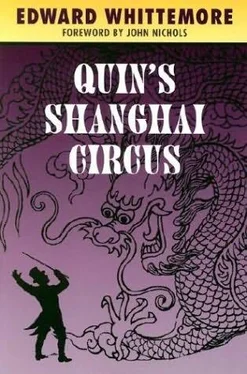Edward Whittemore - Quin’s Shanghai Circus
Здесь есть возможность читать онлайн «Edward Whittemore - Quin’s Shanghai Circus» весь текст электронной книги совершенно бесплатно (целиком полную версию без сокращений). В некоторых случаях можно слушать аудио, скачать через торрент в формате fb2 и присутствует краткое содержание. Жанр: Фэнтези, на английском языке. Описание произведения, (предисловие) а так же отзывы посетителей доступны на портале библиотеки ЛибКат.
- Название:Quin’s Shanghai Circus
- Автор:
- Жанр:
- Год:неизвестен
- ISBN:нет данных
- Рейтинг книги:3 / 5. Голосов: 1
-
Избранное:Добавить в избранное
- Отзывы:
-
Ваша оценка:
- 60
- 1
- 2
- 3
- 4
- 5
Quin’s Shanghai Circus: краткое содержание, описание и аннотация
Предлагаем к чтению аннотацию, описание, краткое содержание или предисловие (зависит от того, что написал сам автор книги «Quin’s Shanghai Circus»). Если вы не нашли необходимую информацию о книге — напишите в комментариях, мы постараемся отыскать её.
Quin’s Shanghai Circus — читать онлайн бесплатно полную книгу (весь текст) целиком
Ниже представлен текст книги, разбитый по страницам. Система сохранения места последней прочитанной страницы, позволяет с удобством читать онлайн бесплатно книгу «Quin’s Shanghai Circus», без необходимости каждый раз заново искать на чём Вы остановились. Поставьте закладку, и сможете в любой момент перейти на страницу, на которой закончили чтение.
Интервал:
Закладка:
The more superstitious of his teachers in Jerusalem interpreted this as an immediate and sure indication that his conversion was in some peculiar way anathema to the Lord. They therefore inveighed against him to fore-sake what he had so recently achieved, to give up his dream of being a Jew and to reembrace his own culture where he was unmistakably, by birth and tradition, in the eyes of all who might look upon him, already both an honored man and an aristocrat.
But Rabbi Lotmann refused. He persisted. He had become a Jew and he would remain one. To allay the fears of his teachers he made reference to Elijah, his favorite prophet, and recalled for them that when the Lord had selected Elijah as His instrument and had feared for his life He had told him to turn eastward, to travel eastward, to hide by a brook before the Jordan where the Lord would then command ravens to feed him.
Now Rabbi Lotmann said that in his case, since he was Japanese, the Jordan must be the Pacific and the brook before the Jordan must be the brook that crossed an estate owned by his family in Kamakura. Thus he decided to turn eastward and travel eastward and go to that estate to await the sustenance God would send him, as He had once sent the ravens to Elijah.
As it happened, his reverence for Elijah saved his life. The level of medical practice available to the elite of Tokyo, many of whom lived in Kamakura, was far beyond anything to be found in Palestine. A routine medical examination immediately revealed that he was not suffering from some divine curse but from diabetes mellitus. Insulin injections had recently been discovered to be a totally effective mode of treatment, so he was on the estate in Kamakura, by the brook before his Jordan, but a short time before his hunger and thirst subsided and he ceased to pass excessive amounts of urine.
The General had spoken often of his twin, his elder by eight minutes, and Mama had long looked forward to meeting him. Ostensibly the occasion for the visit was a koto recital by Rabbi Lotmann. Mama went and found two other guests, both apparently good friends of the rabbi.
One of them was a priest, tall and gaunt, whom she would go to three years later with a request that was inconceivable to her then. But when the time came for her to go to him for help she knew he would do what she asked, for she had only to look once into his eyes on that spring afternoon in Kamakura to know he was a man who never refused anyone a kindness.
The other guest was also a foreigner, a short old man with a merry face who said the exotic name he went by, Adzhar, wasn’t his real name. Like the Rabbi, he was engaged in some massive translation project. After traveling half the world, he said, learning obscure languages and backing obscure causes, he had more recently turned his attention to women. And although he was seventy-eight, he had discovered that he could never be introduced to a woman without loving her completely and at once. So the moment the company of a priest and a rabbi proved tiresome to her he would be overjoyed to take her to his home and serve her iced vodka and iced caviar, which by coincidence he had set aside that very morning.
They all laughed as they moved into the garden, where a beautiful old koto and a second slightly larger one lay side by side on a raised platform.
Do you also play? she said, turning to Father Lamer-eaux.
In music, he answered, God has given me the ears of an angel and the hands of an ape. As a child I was so clumsy on the scales the piano had to be moved out to the barn.
Then you play, she said, turning to Adzhar, who gaily held up his stubby fingers in front of his face.
With these? There have been too many nails in my life, too many blows from the hammer. I have a soul but alas, I was born the son of a shoemaker and a shoemaker’s hands can’t make that kind of music.
And so? she said, turning to the General’s brother.
When I was young, he answered, my mother and I used to play every day on these two instruments. You’ll forgive me, but I’ve been told how well you play and I thought that perhaps today, for a minute or two, you would join me. Will you?
She bowed stiffly, color in her face, the first time she had known embarrassment with a man since she was a girl of eight. Rabbi Lotmann showed her to her place and she sat down beside him. She struck a chord, he answered her.
The recital lasted until the shadows of the pine trees beyond the garden reached across the platform. Nor was it merely an afternoon of music wherein the former Baron Kikuchi and the mistress of the present Baron Kikuchi touched the strings of their separate memories, for as the gaunt face of Father Lamereaux swayed gravely with the flowers, the fourth member of the musicale recited a tale, sang an epic poem he had learned somewhere in his travels.
The short old man with the exotic name spoke of wonders and miracles and voyages beneath the sea. He told of the adventures of a boy who was carried on a dolphin’s back to the emerald kingdom, where the boy met a princess who described the enchanted life that would be his if he remained there. But the boy elected to return home; he waved to the princess and rose above the waves again, waved to the dolphin and walked along the beach to find the trees moved, the houses gone, the familiar paths now leading elsewhere because one day on the dolphin’s back in the emerald kingdom was the same as one hundred years on earth.
Or was it a dolphin? ended Adzhar. Have I been bewitched by my own tale and confused my creatures? Let me ponder for a moment and make sure I have it right. Yes, I’m certain of it now. It wasn’t a dolphin at all. Wait.
They waited, the rabbi and Mama playing their music, the Jesuit nodding amid the flowers. Adzhar was staring at the small gold cross that hung from Mama’s neck, studying it as he had been all afternoon while recounting his verses. Now she looked up from her koto and their eyes met. He smiled and she returned it, plucked a string, knew exactly what his next words would be.
A dragon, announced Adzhar. Dolphins exist and dragons don’t. Of course it had to be a dragon.
They played the last chords. She said good-bye to Adzhar and Father Lamereaux in the garden and walked together with Rabbi Lotmann to her car. By the gate he stopped.
Today, he said, you reminded me of the Baroness. When she married my father she was about the same age you were when you met my brother. Did you know he came to me three years ago to talk to me about marrying you? He was very disturbed that day but not about you, it was something else that bothered him. Shall I tell you about it?
If you wish, she said.
Yes, I’d like to. He spent the weekend here. On Sunday afternoon I played the koto for him and then it was time for him to return to Tokyo. It was December and we had snow that year, if you remember. It was snowing that afternoon. Ever since he had returned from his tour of duty in Shanghai I had been aware that he always wore a small gold cross around his neck. Before he gave it to you, as you know, he kept it hidden under his uniform, but when he was staying with me and wearing a kimono he made no effort to hide it. I had never asked him about the cross and he never mentioned it, but when I saw it was gone that weekend I suspected he might have something to tell me. When I finished playing he didn’t move, so I sat at the instrument and waited.
I have to leave, he said.
I nodded.
It was a lovely weekend, he said in a low voice. I always enjoy the few hours I can spend here with you. It’s a good life you’ve made for yourself. Does the translation go well?
Yes.
And your health is the same?
Yes. I take my injections.
Of course, we do what we have to do. That’s what she taught us, after all, by performing the tea ceremony, turning the bowls at sunset. We do what we have to do.
Читать дальшеИнтервал:
Закладка:
Похожие книги на «Quin’s Shanghai Circus»
Представляем Вашему вниманию похожие книги на «Quin’s Shanghai Circus» списком для выбора. Мы отобрали схожую по названию и смыслу литературу в надежде предоставить читателям больше вариантов отыскать новые, интересные, ещё непрочитанные произведения.
Обсуждение, отзывы о книге «Quin’s Shanghai Circus» и просто собственные мнения читателей. Оставьте ваши комментарии, напишите, что Вы думаете о произведении, его смысле или главных героях. Укажите что конкретно понравилось, а что нет, и почему Вы так считаете.












